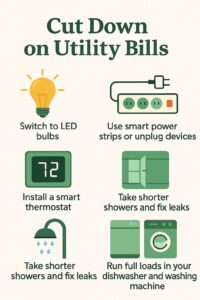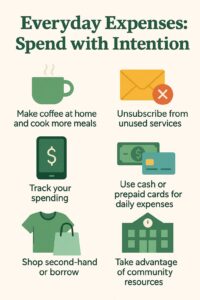Smart Ways to Save Money on Groceries, Utilities, and Everyday Expenses
In today’s fast-paced world, keeping your finances in check can feel like a full-time job. With inflation, rising utility costs, and the pressure of everyday expenses, most of us are searching for real, effective ways to spend less and save more. The good news? You don’t need a major lifestyle overhaul to make that happen. By adopting a few smart habits, you can cut down your costs and still live comfortably. Let’s dive into some smart ways to save money on groceries, utilities, and everyday expenses that you can start using today.
1. Smarter Grocery Shopping
Groceries can quietly eat up a big portion of your monthly budget, but a little planning goes a long way.
Here’s how to save:
• Make a meal plan: Planning your meals weekly helps you shop with purpose and avoid waste.
• Stick to a grocery list: Lists keep you focused and less likely to grab unnecessary items.
• Buy in bulk when it makes sense: Staples like rice, pasta, and canned goods often cost less when bought in larger quantities.
• Shop store brands: Generic brands are typically cheaper and often just as good as name brands.
• Avoid shopping while hungry: It sounds simple, but it’s a proven way to avoid impulse buys.
• Use digital coupons and cashback apps: Tools like Ibotta, Honey, or your supermarket’s app can offer serious savings with just a few taps.
You’ll be surprised how quickly the savings add up when you become more intentional about your grocery runs.

2. Cut Down on Utility Bills
Utilities like electricity, gas, and water are non-negotiables—but your bills don’t have to be sky-high.
Easy ways to reduce utility costs:
• Switch to LED bulbs: They use up to 80% less energy than incandescent ones.
• Use smart power strips or unplug devices: Electronics draw energy even when they’re off—also known as “phantom energy.”
• Install a smart thermostat: This lets you automate your heating and cooling for maximum efficiency.
• Seal windows and doors: Prevent drafts to reduce heating and cooling costs.
• Take shorter showers and fix leaks: A leaking faucet can waste gallons of water and spike your water bill.
• Run full loads in your dishwasher and washing machine: Doing this saves both water and electricity.
By taking a few of these steps, you can see noticeable savings in just one billing cycle.

3. Everyday Expenses: Spend with Intention
It’s easy to lose track of the little things. A coffee here, a streaming service there—it all adds up. But with a few mindset shifts and habits, you can keep these costs in check.
Smart tips for managing daily expenses:
• Make coffee at home and cook more meals: You don’t have to give up treats altogether, but limiting takeout saves hundreds per year.
• Track your spending: Use free tools like Mint, PocketGuard, or even a good old-fashioned spreadsheet.
• Unsubscribe from unused services: Audit your recurring subscriptions every couple of months—many of us pay for things we’ve forgotten about.
• Use cash or prepaid cards for daily expenses: This prevents overspending and helps you stay within budget.
• Shop second-hand or borrow: Whether it’s clothing, tools, or electronics, check local thrift stores, Buy Nothing groups, or Facebook Marketplace before buying new.
• Take advantage of community resources: Free local events, libraries, and public parks offer great entertainment at no cost.
These small shifts can bring big results when practiced consistently.

4. Bonus: Embrace a Mindset Shift
At the core of smart ways to save money on groceries, utilities, and everyday expenses is a mindset change. Think about what brings value to your life, and spend accordingly. Being intentional with your money helps you stay focused and confident in your financial decisions.

Final Thoughts
Living well doesn’t have to mean spending a lot. With some simple changes and a bit of awareness, you can easily find smart ways to save money on groceries, utilities, and everyday expenses. The key is being proactive instead of reactive—take charge of your money before it takes charge of you.
Start with one area of your life—maybe grocery shopping—and then build from there. Over time, you’ll not only see the numbers in your bank account grow, but you’ll also feel more confident and in control of your financial future.
